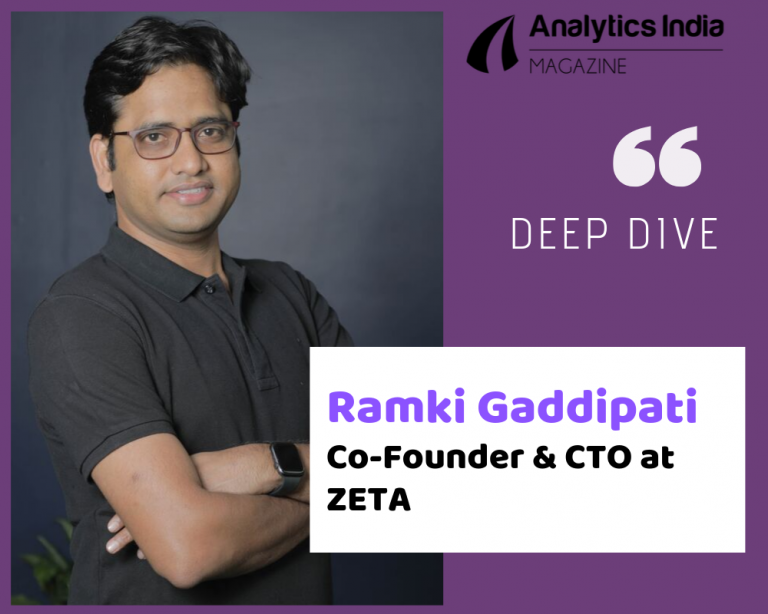Founded in 2015, Zeta is a Bengaluru-based banking tech startup that joined the unicorn club in May. Co-founded by Ramki Gaddipati and Bhavin Turakhia, Zeta provides a full-stack, cloud-native, API-first, neo-banking platform including a digital core and a payment engine for issuance of credit, debit, and prepaid products. Zeta counts over ten banks and 25 fintech customers across eight countries, including Sodexo, HDFC Bank, Kotak Mahindra Bank, Axis Bank, IndusInd Bank, Yes Bank, RBL Bank, SBM Bank India and others.
In a conversation with Analytics India Magazine, Ramki Gaddipati, CTO & Co-Founder, Zeta, explains how analytics and machine learning helps revolutionise the banking tech landscape:
AIM: How is your company implementing AI/ML/Analytics to drive growth? Discuss briefly by citing use cases or customer success stories.
Ramki: Infusing AI is a crucial aspect of digital transformation. By using APIs, banks and other companies can introduce AI capabilities into their already existing apps without any help from data scientists or engineers with AI specialisation. Artificial intelligence (AI) and Machine Learning (ML) are complex and multifaceted programs. API is simply one of the significant tools across these programs. It powerfully automates various programs by saving a lot of time and energy and giving loads of new data streams.
Creating applications based on artificial intelligence technology is a time-consuming and complex process, but APIs make it simple and affordable, thus making all the necessary security measures required in a bank accessible at a low cost. However, the choice of API for machine learning projects will depend on a specific industry. In a banking project, the use of API along with AI and ML is necessary to determine the security factors of the customers. Ensuring security with an open banking technology platform like API is never easy. It is mandatory to partner with prominent technology firms to secure financial transactions.
Zeta Fusion is an Embeddable Banking platform that enables banks to provide APIs and SDKs to fintech, neobanks, distributors and enable them to embed prepaid, credit, debit and loan products within their apps and experiences.
AIM: What are the programming languages predominantly used by your data science team? What percentage of resources are focused on implementing state of the art?
Ramki: The most commonly used programming languages at Zeta are Java, Javascript and Python. Apart from that, Bootstrap, JQuery and Ruby are also some of the languages we make use of to enhance the value delivered by our platform.
50% of the workforce is part of the engineering team at Zeta, and 10% is the product management team that mostly deal with AI/ML functions.
AIM: What does the toolstack of your team look like?
Ramki: For our server, backend, and microservices, we leverage Java Spring Boot, PostgreSQL, ELK Stack, Kafka, Kubernetes, Serverless, AWS, etc.
We use tools like Jermu, Zabbix, Jenkins, Sonar, ArgoCD, etc. Plus, our mobile apps are ReactNative, iOS-Native and Android-native.
AIM: What are the primary skills you look for while hiring data scientists/ML engineers?
Ramki: At Zeta, we place a lot of emphasis on problem-solving and, therefore, look out for problem solvers. The attitude an individual brings to work is also an important skill we consider. Someone who demonstrates a great work ethic, strong ownership towards the work they do, and does not mind going that extra mile is considered to be the best fit for our company.
We hire aspirants who display excellence in data structures and algorithms. In addition, they demonstrate strong design skills and have a firm grasp of coding and engineering practices. Along with exhibiting a great sense of ownership, the aspirant should also come with an ability to solve problems fast and a great love for engineering.
AIM: What kinds of challenges do you face while recruiting Indian talent?
Ramki: We believe that hiring the best talent pool is a good problem. Challenges like these help us and our leadership team stay focused and lead us to take on new initiatives, which are challenging enough to attract the best minds in the industry. At Zeta, we aim not just to attract the best but also to retain them. And, for this, we have programmes that define a clear growth path and opportunities to build on personal projects.
As we grow further, it’s also key for us to keep up with the company culture and values. These values define us and guide all our decisions, including hiring people. We insist on working with people who are willing to champion our organisational culture for their growth and that of the company.
AIM: Is outsourcing the innovation your preference or having an in-house R&D team?
Ramki: As we continue to chase our vision to augment the purpose of money and banking through technology, we are focusing on expanding our in-house R&D team. We are expanding our footprint rapidly, and Hyderabad is emerging as a prime hub for excellent tech talent.
Eager to be among such a thriving community, we decided to set up our next products, engineering, and operations hub here, another one being in Bangalore. This collective at Hyderabad will have the opportunity to play a critical role in building Zeta’s products for the global markets and delivering cloud infrastructure and data products.
AIM: How do you think the landscape of AI/ML will evolve in India with regards to your domain?
Ramki: Digital transformation is highly crucial, especially in the current time context. One of the significant challenges is to modernise banks and legacy business systems without causing any disruptions to the existing system. However, artificial intelligence and machine learning have evolved as the crucial enablers in conducting hassle- and risk-free digital transformation. An AI and ML led approach to system modernisation will allow businesses to collaborate with other Fintech services to adapt to modern demands and regulations while increasing safety and enabling security.
Fintech brands are rapidly adopting AI and ML in a range of applications across multiple channels to leverage all the available client data to predict how customers’ needs are evolving, what services will prove to be beneficial for them, what kind of fraudulent activity has the highest possibility to attack a customer’s system, etc. It’s time for banks to leverage the power of AI and ML in banking, along with data science acceleration, to enhance customer’s portfolio offerings.
















































































